Integrated Logistics Management: An Analysis of ALDI's Operations
VerifiedAdded on 2021/02/20
|12
|3625
|66
Report
AI Summary
This report provides an in-depth analysis of ALDI's integrated logistics management, focusing on its supply chain operations. It begins with an overview of ALDI, a major retail supermarket, and its supply chain, including transportation, warehousing, and packaging. A high-level supply chain map is presented, followed by a critical evaluation of these key areas. The report examines transportation methods, highlighting the company's efficiency and cost-saving measures. It also assesses warehousing practices, emphasizing the use of technology and sustainability. Additionally, the role of packaging and labeling in protecting goods and marketing is discussed. The report concludes with recommendations for improving ALDI's logistics, such as adopting automation, optimizing warehouse management, and enhancing transportation efficiency. Finally, it explores the application of big data analytics to further improve integrated logistics management, offering insights into market trends and decision-making.
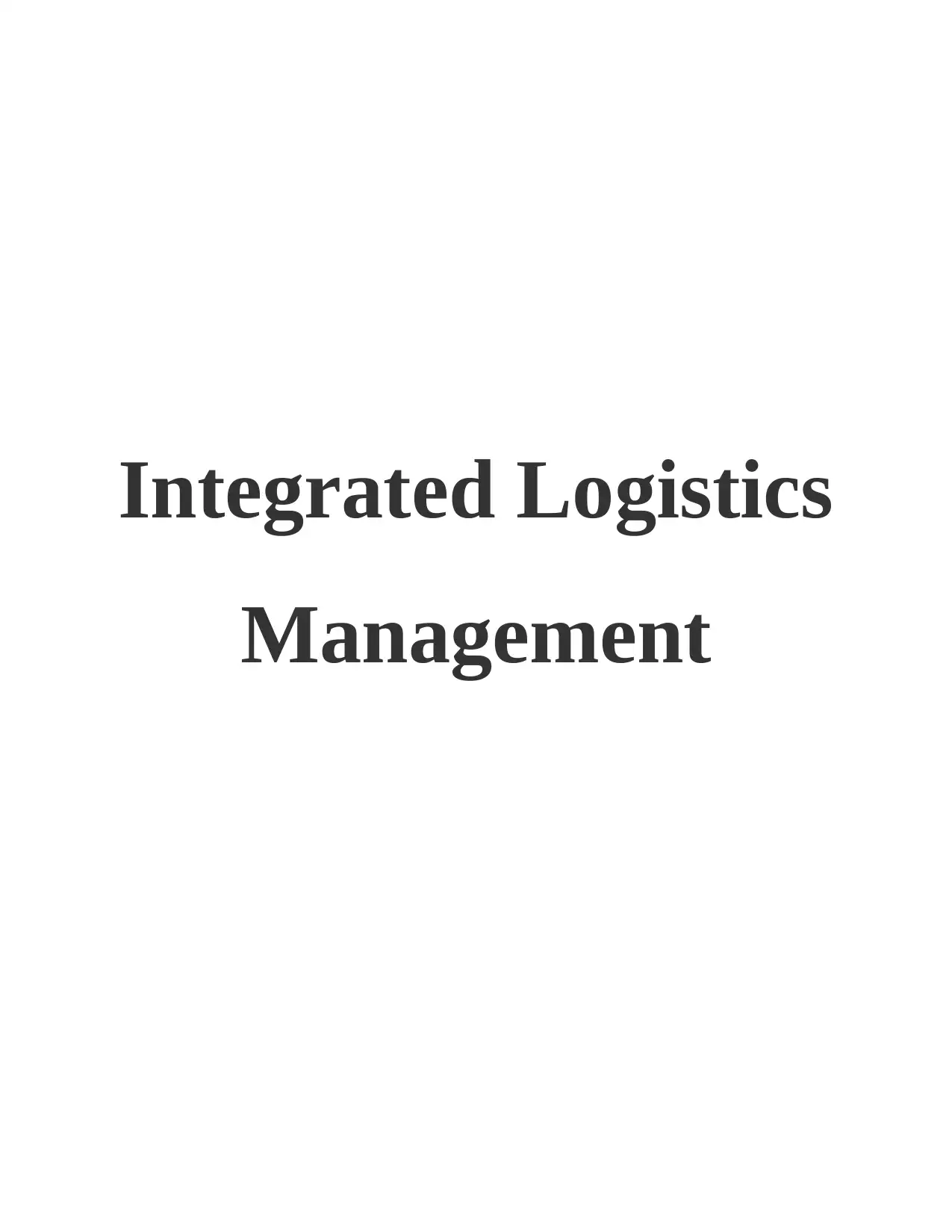
Integrated Logistics
Management
Management
Paraphrase This Document
Need a fresh take? Get an instant paraphrase of this document with our AI Paraphraser
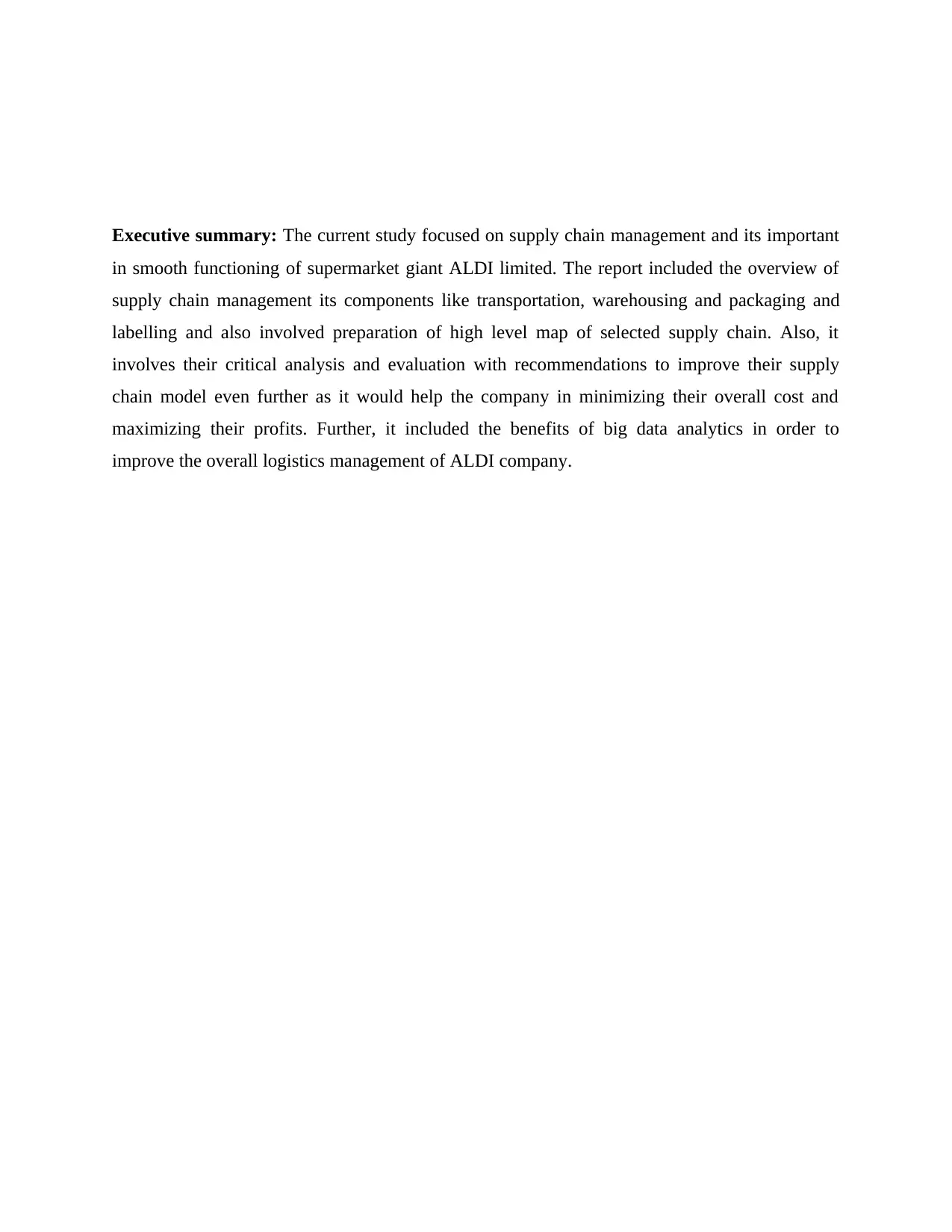
Executive summary: The current study focused on supply chain management and its important
in smooth functioning of supermarket giant ALDI limited. The report included the overview of
supply chain management its components like transportation, warehousing and packaging and
labelling and also involved preparation of high level map of selected supply chain. Also, it
involves their critical analysis and evaluation with recommendations to improve their supply
chain model even further as it would help the company in minimizing their overall cost and
maximizing their profits. Further, it included the benefits of big data analytics in order to
improve the overall logistics management of ALDI company.
in smooth functioning of supermarket giant ALDI limited. The report included the overview of
supply chain management its components like transportation, warehousing and packaging and
labelling and also involved preparation of high level map of selected supply chain. Also, it
involves their critical analysis and evaluation with recommendations to improve their supply
chain model even further as it would help the company in minimizing their overall cost and
maximizing their profits. Further, it included the benefits of big data analytics in order to
improve the overall logistics management of ALDI company.
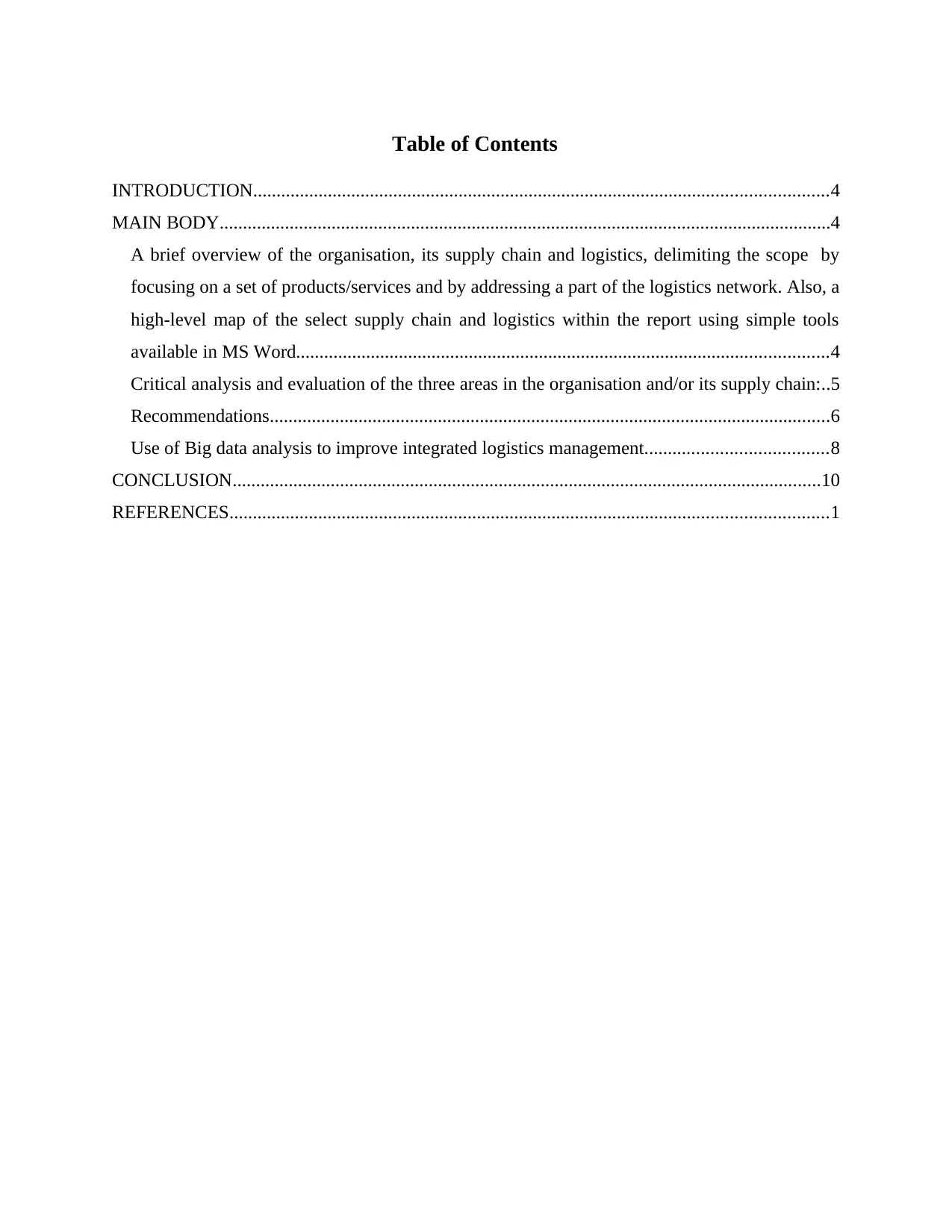
Table of Contents
INTRODUCTION...........................................................................................................................4
MAIN BODY...................................................................................................................................4
A brief overview of the organisation, its supply chain and logistics, delimiting the scope by
focusing on a set of products/services and by addressing a part of the logistics network. Also, a
high-level map of the select supply chain and logistics within the report using simple tools
available in MS Word..................................................................................................................4
Critical analysis and evaluation of the three areas in the organisation and/or its supply chain:..5
Recommendations........................................................................................................................6
Use of Big data analysis to improve integrated logistics management.......................................8
CONCLUSION..............................................................................................................................10
REFERENCES................................................................................................................................1
INTRODUCTION...........................................................................................................................4
MAIN BODY...................................................................................................................................4
A brief overview of the organisation, its supply chain and logistics, delimiting the scope by
focusing on a set of products/services and by addressing a part of the logistics network. Also, a
high-level map of the select supply chain and logistics within the report using simple tools
available in MS Word..................................................................................................................4
Critical analysis and evaluation of the three areas in the organisation and/or its supply chain:..5
Recommendations........................................................................................................................6
Use of Big data analysis to improve integrated logistics management.......................................8
CONCLUSION..............................................................................................................................10
REFERENCES................................................................................................................................1
⊘ This is a preview!⊘
Do you want full access?
Subscribe today to unlock all pages.

Trusted by 1+ million students worldwide
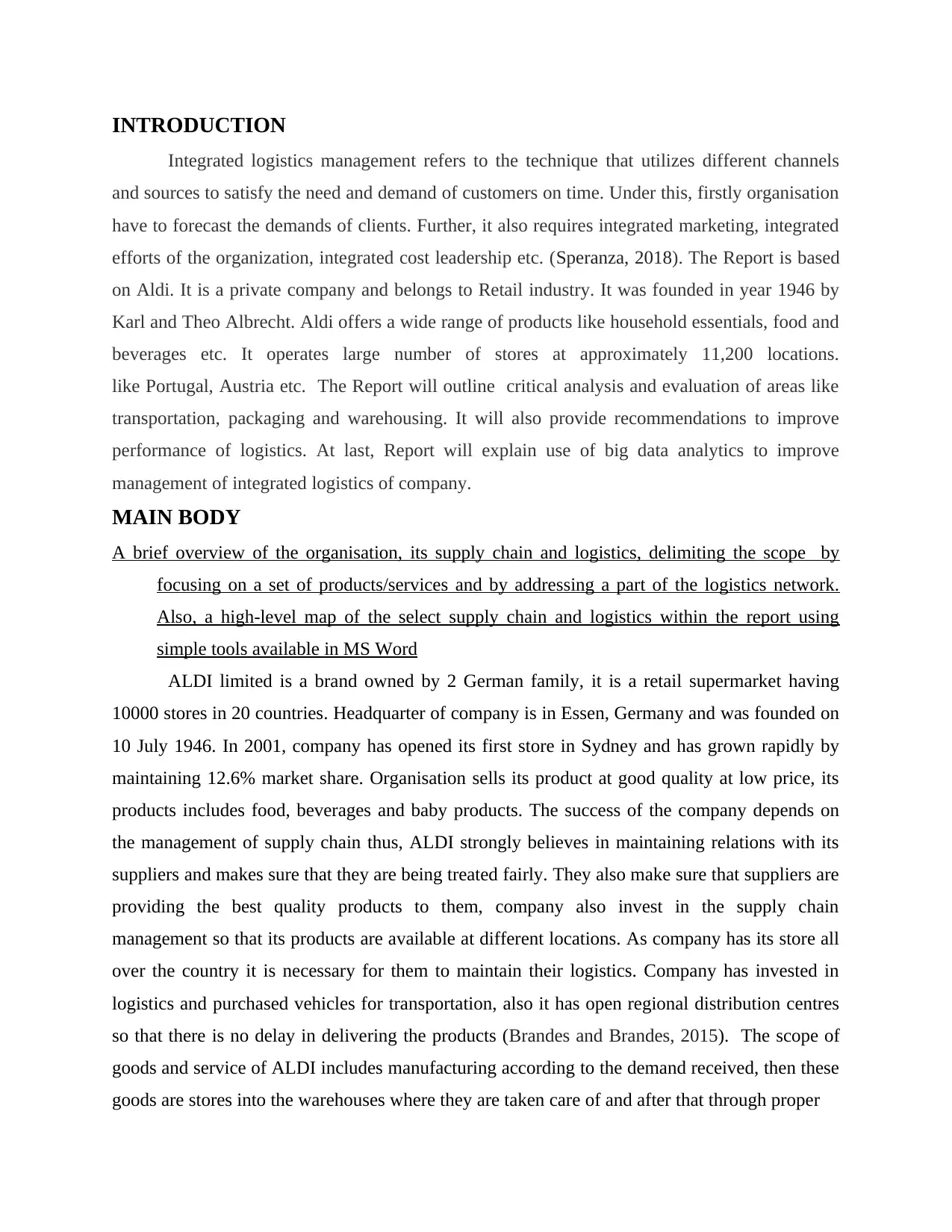
INTRODUCTION
Integrated logistics management refers to the technique that utilizes different channels
and sources to satisfy the need and demand of customers on time. Under this, firstly organisation
have to forecast the demands of clients. Further, it also requires integrated marketing, integrated
efforts of the organization, integrated cost leadership etc. (Speranza, 2018). The Report is based
on Aldi. It is a private company and belongs to Retail industry. It was founded in year 1946 by
Karl and Theo Albrecht. Aldi offers a wide range of products like household essentials, food and
beverages etc. It operates large number of stores at approximately 11,200 locations.
like Portugal, Austria etc. The Report will outline critical analysis and evaluation of areas like
transportation, packaging and warehousing. It will also provide recommendations to improve
performance of logistics. At last, Report will explain use of big data analytics to improve
management of integrated logistics of company.
MAIN BODY
A brief overview of the organisation, its supply chain and logistics, delimiting the scope by
focusing on a set of products/services and by addressing a part of the logistics network.
Also, a high-level map of the select supply chain and logistics within the report using
simple tools available in MS Word
ALDI limited is a brand owned by 2 German family, it is a retail supermarket having
10000 stores in 20 countries. Headquarter of company is in Essen, Germany and was founded on
10 July 1946. In 2001, company has opened its first store in Sydney and has grown rapidly by
maintaining 12.6% market share. Organisation sells its product at good quality at low price, its
products includes food, beverages and baby products. The success of the company depends on
the management of supply chain thus, ALDI strongly believes in maintaining relations with its
suppliers and makes sure that they are being treated fairly. They also make sure that suppliers are
providing the best quality products to them, company also invest in the supply chain
management so that its products are available at different locations. As company has its store all
over the country it is necessary for them to maintain their logistics. Company has invested in
logistics and purchased vehicles for transportation, also it has open regional distribution centres
so that there is no delay in delivering the products (Brandes and Brandes, 2015). The scope of
goods and service of ALDI includes manufacturing according to the demand received, then these
goods are stores into the warehouses where they are taken care of and after that through proper
Integrated logistics management refers to the technique that utilizes different channels
and sources to satisfy the need and demand of customers on time. Under this, firstly organisation
have to forecast the demands of clients. Further, it also requires integrated marketing, integrated
efforts of the organization, integrated cost leadership etc. (Speranza, 2018). The Report is based
on Aldi. It is a private company and belongs to Retail industry. It was founded in year 1946 by
Karl and Theo Albrecht. Aldi offers a wide range of products like household essentials, food and
beverages etc. It operates large number of stores at approximately 11,200 locations.
like Portugal, Austria etc. The Report will outline critical analysis and evaluation of areas like
transportation, packaging and warehousing. It will also provide recommendations to improve
performance of logistics. At last, Report will explain use of big data analytics to improve
management of integrated logistics of company.
MAIN BODY
A brief overview of the organisation, its supply chain and logistics, delimiting the scope by
focusing on a set of products/services and by addressing a part of the logistics network.
Also, a high-level map of the select supply chain and logistics within the report using
simple tools available in MS Word
ALDI limited is a brand owned by 2 German family, it is a retail supermarket having
10000 stores in 20 countries. Headquarter of company is in Essen, Germany and was founded on
10 July 1946. In 2001, company has opened its first store in Sydney and has grown rapidly by
maintaining 12.6% market share. Organisation sells its product at good quality at low price, its
products includes food, beverages and baby products. The success of the company depends on
the management of supply chain thus, ALDI strongly believes in maintaining relations with its
suppliers and makes sure that they are being treated fairly. They also make sure that suppliers are
providing the best quality products to them, company also invest in the supply chain
management so that its products are available at different locations. As company has its store all
over the country it is necessary for them to maintain their logistics. Company has invested in
logistics and purchased vehicles for transportation, also it has open regional distribution centres
so that there is no delay in delivering the products (Brandes and Brandes, 2015). The scope of
goods and service of ALDI includes manufacturing according to the demand received, then these
goods are stores into the warehouses where they are taken care of and after that through proper
Paraphrase This Document
Need a fresh take? Get an instant paraphrase of this document with our AI Paraphraser
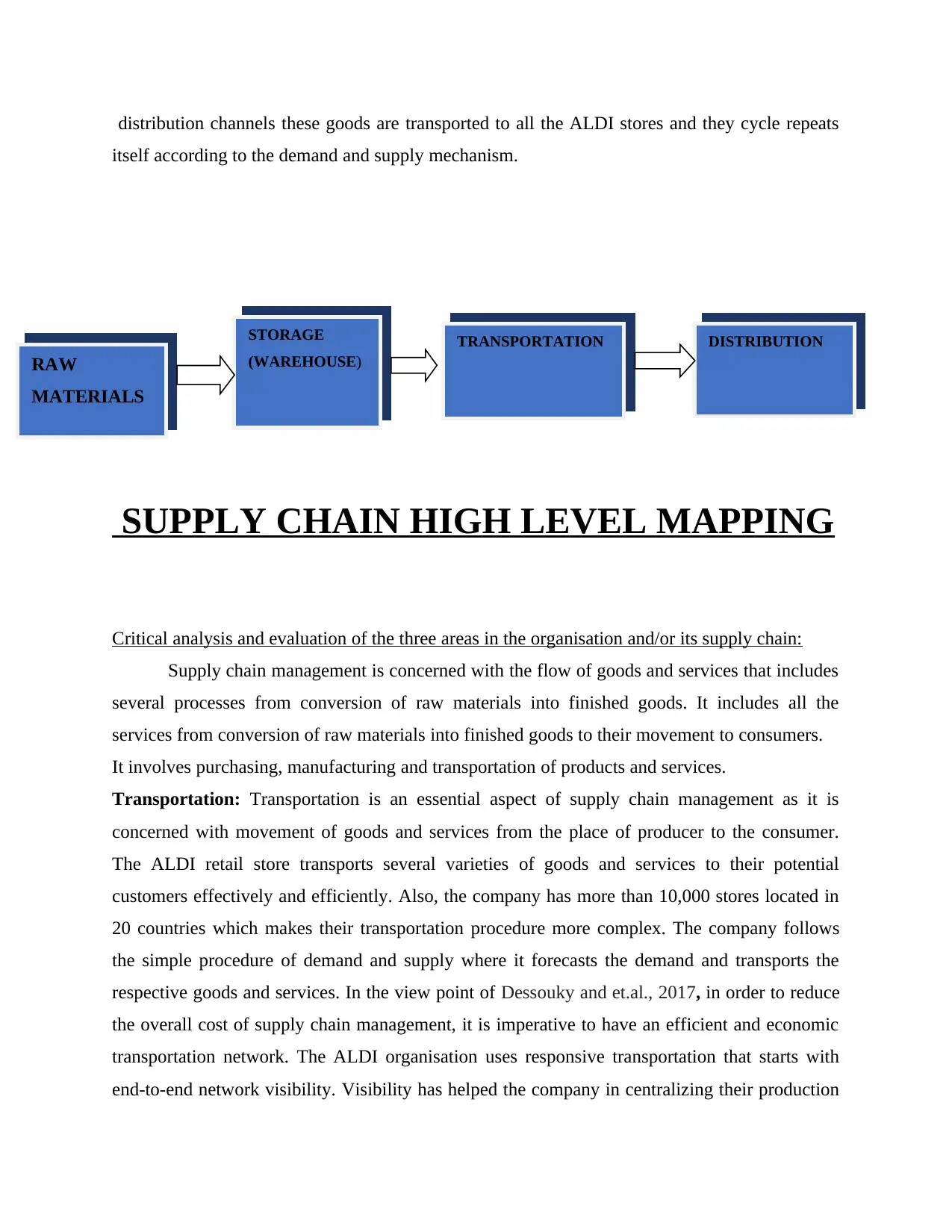
distribution channels these goods are transported to all the ALDI stores and they cycle repeats
itself according to the demand and supply mechanism.
SUPPLY CHAIN HIGH LEVEL MAPPING
Critical analysis and evaluation of the three areas in the organisation and/or its supply chain:
Supply chain management is concerned with the flow of goods and services that includes
several processes from conversion of raw materials into finished goods. It includes all the
services from conversion of raw materials into finished goods to their movement to consumers.
It involves purchasing, manufacturing and transportation of products and services.
Transportation: Transportation is an essential aspect of supply chain management as it is
concerned with movement of goods and services from the place of producer to the consumer.
The ALDI retail store transports several varieties of goods and services to their potential
customers effectively and efficiently. Also, the company has more than 10,000 stores located in
20 countries which makes their transportation procedure more complex. The company follows
the simple procedure of demand and supply where it forecasts the demand and transports the
respective goods and services. In the view point of Dessouky and et.al., 2017, in order to reduce
the overall cost of supply chain management, it is imperative to have an efficient and economic
transportation network. The ALDI organisation uses responsive transportation that starts with
end-to-end network visibility. Visibility has helped the company in centralizing their production
RAW
MATERIALS
STORAGE
(WAREHOUSE)
TRANSPORTATION DISTRIBUTION
itself according to the demand and supply mechanism.
SUPPLY CHAIN HIGH LEVEL MAPPING
Critical analysis and evaluation of the three areas in the organisation and/or its supply chain:
Supply chain management is concerned with the flow of goods and services that includes
several processes from conversion of raw materials into finished goods. It includes all the
services from conversion of raw materials into finished goods to their movement to consumers.
It involves purchasing, manufacturing and transportation of products and services.
Transportation: Transportation is an essential aspect of supply chain management as it is
concerned with movement of goods and services from the place of producer to the consumer.
The ALDI retail store transports several varieties of goods and services to their potential
customers effectively and efficiently. Also, the company has more than 10,000 stores located in
20 countries which makes their transportation procedure more complex. The company follows
the simple procedure of demand and supply where it forecasts the demand and transports the
respective goods and services. In the view point of Dessouky and et.al., 2017, in order to reduce
the overall cost of supply chain management, it is imperative to have an efficient and economic
transportation network. The ALDI organisation uses responsive transportation that starts with
end-to-end network visibility. Visibility has helped the company in centralizing their production
RAW
MATERIALS
STORAGE
(WAREHOUSE)
TRANSPORTATION DISTRIBUTION
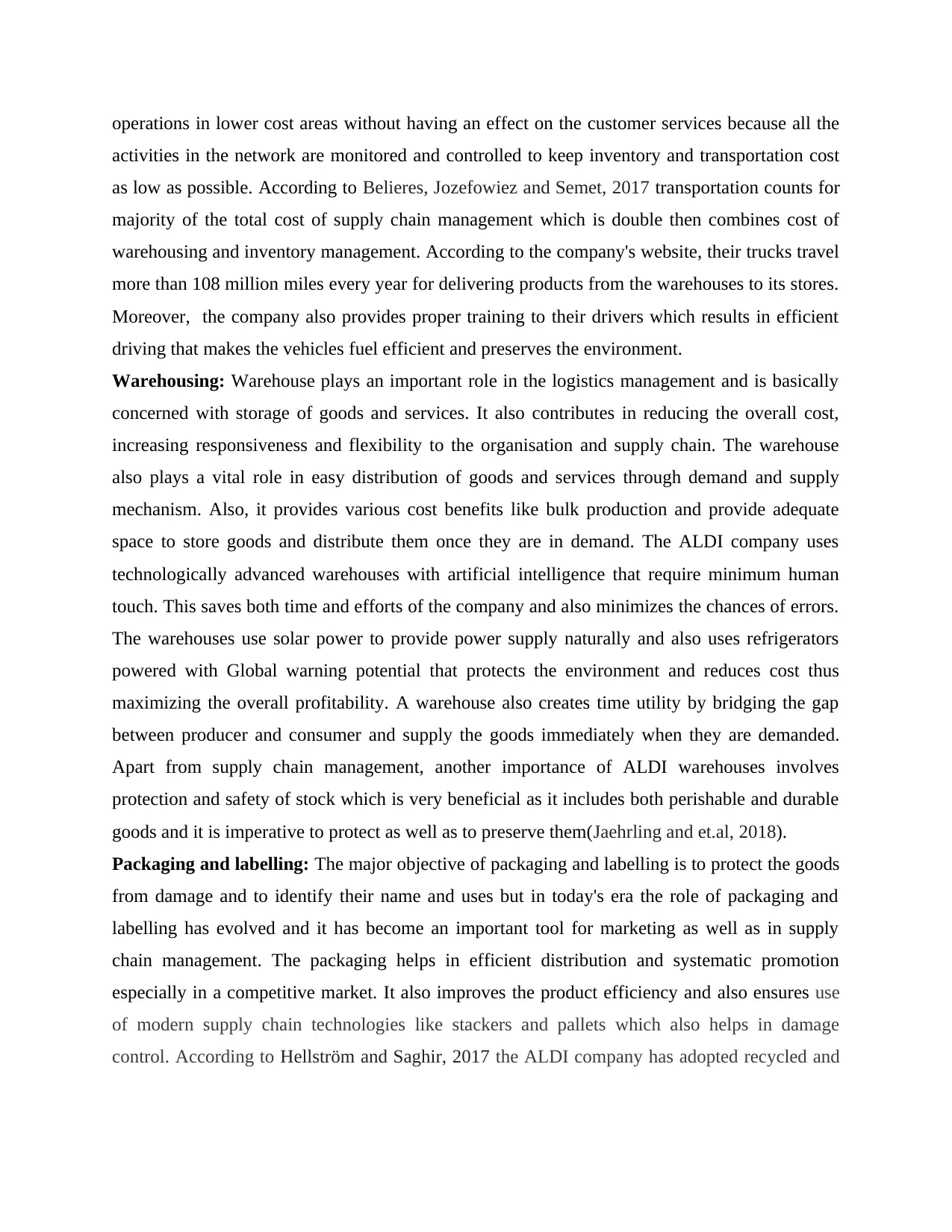
operations in lower cost areas without having an effect on the customer services because all the
activities in the network are monitored and controlled to keep inventory and transportation cost
as low as possible. According to Belieres, Jozefowiez and Semet, 2017 transportation counts for
majority of the total cost of supply chain management which is double then combines cost of
warehousing and inventory management. According to the company's website, their trucks travel
more than 108 million miles every year for delivering products from the warehouses to its stores.
Moreover, the company also provides proper training to their drivers which results in efficient
driving that makes the vehicles fuel efficient and preserves the environment.
Warehousing: Warehouse plays an important role in the logistics management and is basically
concerned with storage of goods and services. It also contributes in reducing the overall cost,
increasing responsiveness and flexibility to the organisation and supply chain. The warehouse
also plays a vital role in easy distribution of goods and services through demand and supply
mechanism. Also, it provides various cost benefits like bulk production and provide adequate
space to store goods and distribute them once they are in demand. The ALDI company uses
technologically advanced warehouses with artificial intelligence that require minimum human
touch. This saves both time and efforts of the company and also minimizes the chances of errors.
The warehouses use solar power to provide power supply naturally and also uses refrigerators
powered with Global warning potential that protects the environment and reduces cost thus
maximizing the overall profitability. A warehouse also creates time utility by bridging the gap
between producer and consumer and supply the goods immediately when they are demanded.
Apart from supply chain management, another importance of ALDI warehouses involves
protection and safety of stock which is very beneficial as it includes both perishable and durable
goods and it is imperative to protect as well as to preserve them(Jaehrling and et.al, 2018).
Packaging and labelling: The major objective of packaging and labelling is to protect the goods
from damage and to identify their name and uses but in today's era the role of packaging and
labelling has evolved and it has become an important tool for marketing as well as in supply
chain management. The packaging helps in efficient distribution and systematic promotion
especially in a competitive market. It also improves the product efficiency and also ensures use
of modern supply chain technologies like stackers and pallets which also helps in damage
control. According to Hellström and Saghir, 2017 the ALDI company has adopted recycled and
activities in the network are monitored and controlled to keep inventory and transportation cost
as low as possible. According to Belieres, Jozefowiez and Semet, 2017 transportation counts for
majority of the total cost of supply chain management which is double then combines cost of
warehousing and inventory management. According to the company's website, their trucks travel
more than 108 million miles every year for delivering products from the warehouses to its stores.
Moreover, the company also provides proper training to their drivers which results in efficient
driving that makes the vehicles fuel efficient and preserves the environment.
Warehousing: Warehouse plays an important role in the logistics management and is basically
concerned with storage of goods and services. It also contributes in reducing the overall cost,
increasing responsiveness and flexibility to the organisation and supply chain. The warehouse
also plays a vital role in easy distribution of goods and services through demand and supply
mechanism. Also, it provides various cost benefits like bulk production and provide adequate
space to store goods and distribute them once they are in demand. The ALDI company uses
technologically advanced warehouses with artificial intelligence that require minimum human
touch. This saves both time and efforts of the company and also minimizes the chances of errors.
The warehouses use solar power to provide power supply naturally and also uses refrigerators
powered with Global warning potential that protects the environment and reduces cost thus
maximizing the overall profitability. A warehouse also creates time utility by bridging the gap
between producer and consumer and supply the goods immediately when they are demanded.
Apart from supply chain management, another importance of ALDI warehouses involves
protection and safety of stock which is very beneficial as it includes both perishable and durable
goods and it is imperative to protect as well as to preserve them(Jaehrling and et.al, 2018).
Packaging and labelling: The major objective of packaging and labelling is to protect the goods
from damage and to identify their name and uses but in today's era the role of packaging and
labelling has evolved and it has become an important tool for marketing as well as in supply
chain management. The packaging helps in efficient distribution and systematic promotion
especially in a competitive market. It also improves the product efficiency and also ensures use
of modern supply chain technologies like stackers and pallets which also helps in damage
control. According to Hellström and Saghir, 2017 the ALDI company has adopted recycled and
⊘ This is a preview!⊘
Do you want full access?
Subscribe today to unlock all pages.

Trusted by 1+ million students worldwide
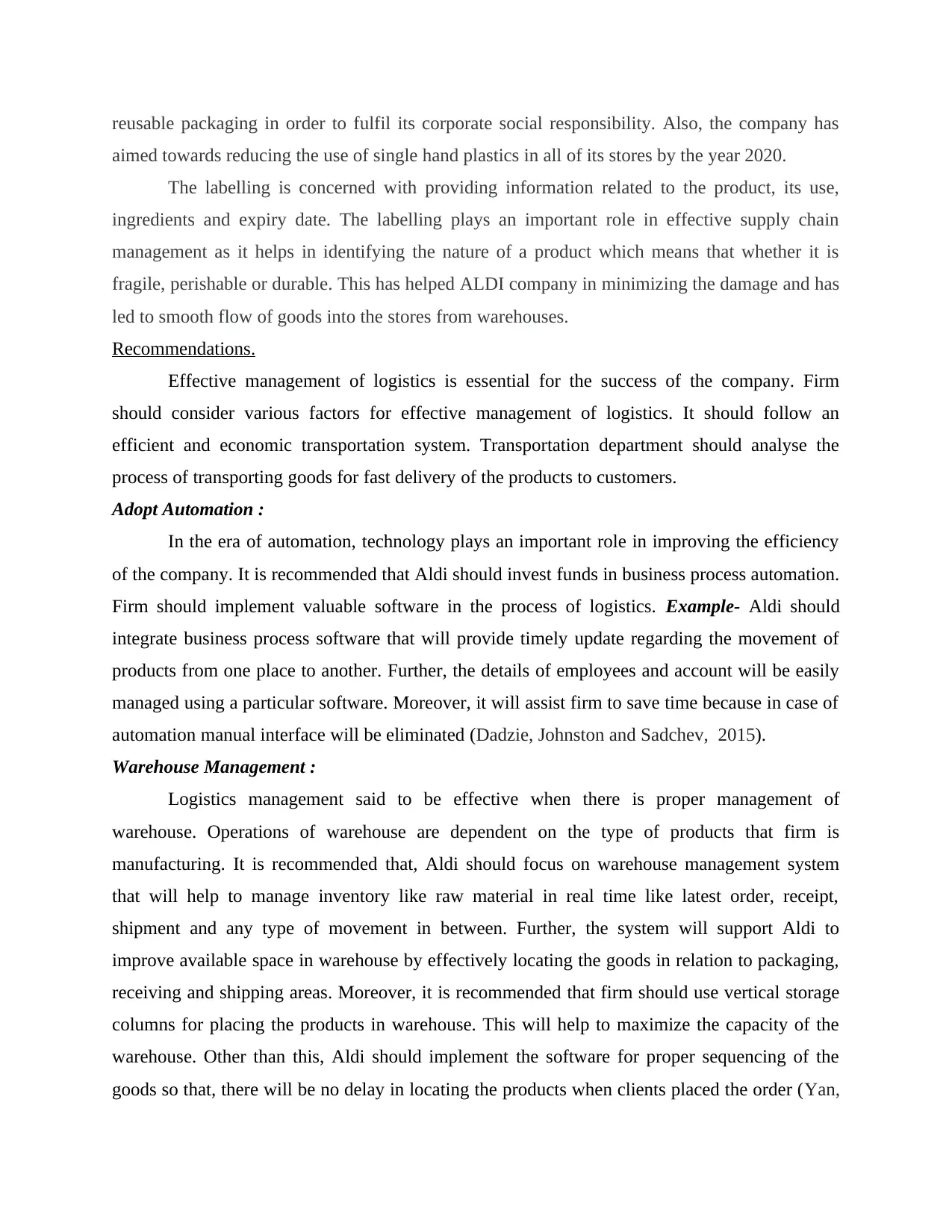
reusable packaging in order to fulfil its corporate social responsibility. Also, the company has
aimed towards reducing the use of single hand plastics in all of its stores by the year 2020.
The labelling is concerned with providing information related to the product, its use,
ingredients and expiry date. The labelling plays an important role in effective supply chain
management as it helps in identifying the nature of a product which means that whether it is
fragile, perishable or durable. This has helped ALDI company in minimizing the damage and has
led to smooth flow of goods into the stores from warehouses.
Recommendations.
Effective management of logistics is essential for the success of the company. Firm
should consider various factors for effective management of logistics. It should follow an
efficient and economic transportation system. Transportation department should analyse the
process of transporting goods for fast delivery of the products to customers.
Adopt Automation :
In the era of automation, technology plays an important role in improving the efficiency
of the company. It is recommended that Aldi should invest funds in business process automation.
Firm should implement valuable software in the process of logistics. Example- Aldi should
integrate business process software that will provide timely update regarding the movement of
products from one place to another. Further, the details of employees and account will be easily
managed using a particular software. Moreover, it will assist firm to save time because in case of
automation manual interface will be eliminated (Dadzie, Johnston and Sadchev, 2015).
Warehouse Management :
Logistics management said to be effective when there is proper management of
warehouse. Operations of warehouse are dependent on the type of products that firm is
manufacturing. It is recommended that, Aldi should focus on warehouse management system
that will help to manage inventory like raw material in real time like latest order, receipt,
shipment and any type of movement in between. Further, the system will support Aldi to
improve available space in warehouse by effectively locating the goods in relation to packaging,
receiving and shipping areas. Moreover, it is recommended that firm should use vertical storage
columns for placing the products in warehouse. This will help to maximize the capacity of the
warehouse. Other than this, Aldi should implement the software for proper sequencing of the
goods so that, there will be no delay in locating the products when clients placed the order (Yan,
aimed towards reducing the use of single hand plastics in all of its stores by the year 2020.
The labelling is concerned with providing information related to the product, its use,
ingredients and expiry date. The labelling plays an important role in effective supply chain
management as it helps in identifying the nature of a product which means that whether it is
fragile, perishable or durable. This has helped ALDI company in minimizing the damage and has
led to smooth flow of goods into the stores from warehouses.
Recommendations.
Effective management of logistics is essential for the success of the company. Firm
should consider various factors for effective management of logistics. It should follow an
efficient and economic transportation system. Transportation department should analyse the
process of transporting goods for fast delivery of the products to customers.
Adopt Automation :
In the era of automation, technology plays an important role in improving the efficiency
of the company. It is recommended that Aldi should invest funds in business process automation.
Firm should implement valuable software in the process of logistics. Example- Aldi should
integrate business process software that will provide timely update regarding the movement of
products from one place to another. Further, the details of employees and account will be easily
managed using a particular software. Moreover, it will assist firm to save time because in case of
automation manual interface will be eliminated (Dadzie, Johnston and Sadchev, 2015).
Warehouse Management :
Logistics management said to be effective when there is proper management of
warehouse. Operations of warehouse are dependent on the type of products that firm is
manufacturing. It is recommended that, Aldi should focus on warehouse management system
that will help to manage inventory like raw material in real time like latest order, receipt,
shipment and any type of movement in between. Further, the system will support Aldi to
improve available space in warehouse by effectively locating the goods in relation to packaging,
receiving and shipping areas. Moreover, it is recommended that firm should use vertical storage
columns for placing the products in warehouse. This will help to maximize the capacity of the
warehouse. Other than this, Aldi should implement the software for proper sequencing of the
goods so that, there will be no delay in locating the products when clients placed the order (Yan,
Paraphrase This Document
Need a fresh take? Get an instant paraphrase of this document with our AI Paraphraser
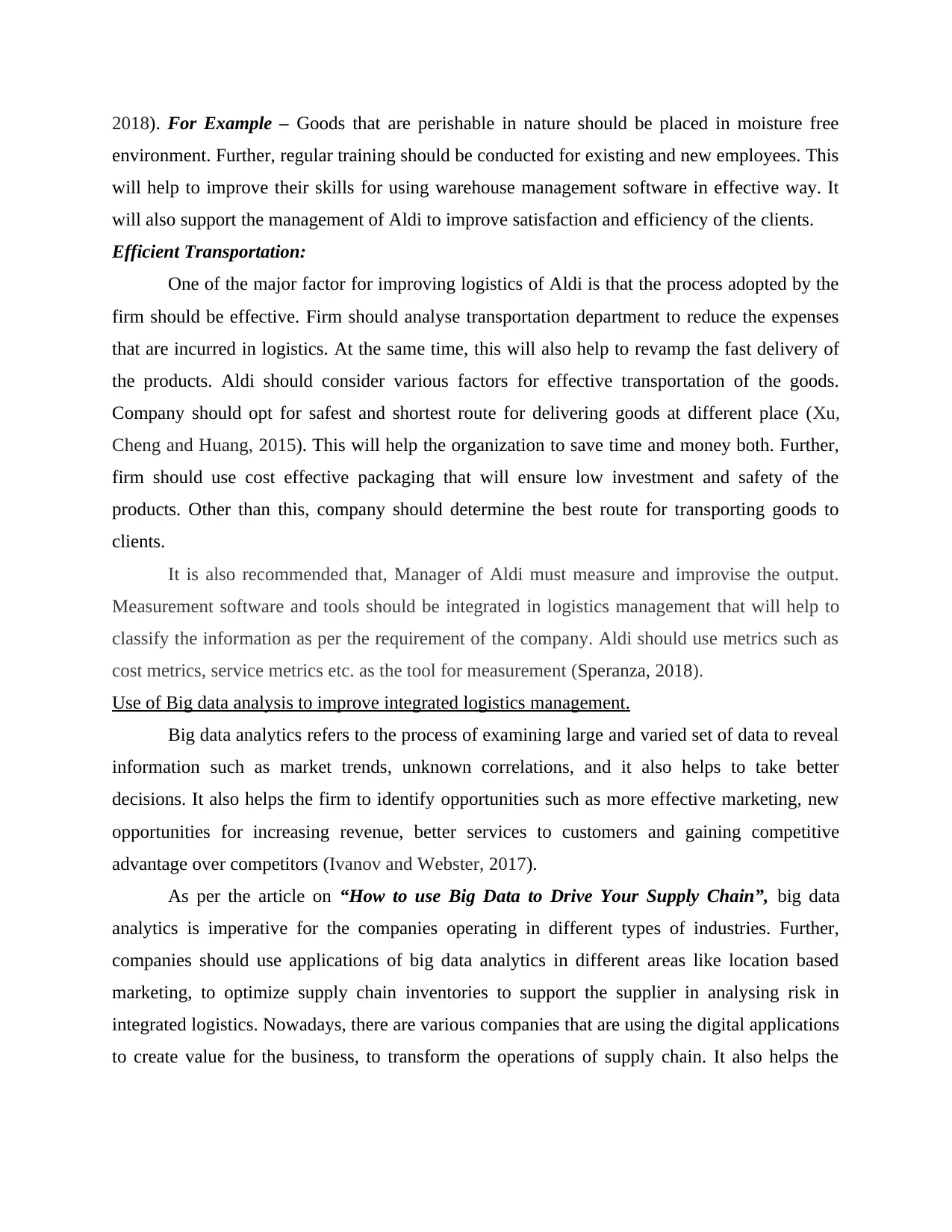
2018). For Example – Goods that are perishable in nature should be placed in moisture free
environment. Further, regular training should be conducted for existing and new employees. This
will help to improve their skills for using warehouse management software in effective way. It
will also support the management of Aldi to improve satisfaction and efficiency of the clients.
Efficient Transportation:
One of the major factor for improving logistics of Aldi is that the process adopted by the
firm should be effective. Firm should analyse transportation department to reduce the expenses
that are incurred in logistics. At the same time, this will also help to revamp the fast delivery of
the products. Aldi should consider various factors for effective transportation of the goods.
Company should opt for safest and shortest route for delivering goods at different place (Xu,
Cheng and Huang, 2015). This will help the organization to save time and money both. Further,
firm should use cost effective packaging that will ensure low investment and safety of the
products. Other than this, company should determine the best route for transporting goods to
clients.
It is also recommended that, Manager of Aldi must measure and improvise the output.
Measurement software and tools should be integrated in logistics management that will help to
classify the information as per the requirement of the company. Aldi should use metrics such as
cost metrics, service metrics etc. as the tool for measurement (Speranza, 2018).
Use of Big data analysis to improve integrated logistics management.
Big data analytics refers to the process of examining large and varied set of data to reveal
information such as market trends, unknown correlations, and it also helps to take better
decisions. It also helps the firm to identify opportunities such as more effective marketing, new
opportunities for increasing revenue, better services to customers and gaining competitive
advantage over competitors (Ivanov and Webster, 2017).
As per the article on “How to use Big Data to Drive Your Supply Chain”, big data
analytics is imperative for the companies operating in different types of industries. Further,
companies should use applications of big data analytics in different areas like location based
marketing, to optimize supply chain inventories to support the supplier in analysing risk in
integrated logistics. Nowadays, there are various companies that are using the digital applications
to create value for the business, to transform the operations of supply chain. It also helps the
environment. Further, regular training should be conducted for existing and new employees. This
will help to improve their skills for using warehouse management software in effective way. It
will also support the management of Aldi to improve satisfaction and efficiency of the clients.
Efficient Transportation:
One of the major factor for improving logistics of Aldi is that the process adopted by the
firm should be effective. Firm should analyse transportation department to reduce the expenses
that are incurred in logistics. At the same time, this will also help to revamp the fast delivery of
the products. Aldi should consider various factors for effective transportation of the goods.
Company should opt for safest and shortest route for delivering goods at different place (Xu,
Cheng and Huang, 2015). This will help the organization to save time and money both. Further,
firm should use cost effective packaging that will ensure low investment and safety of the
products. Other than this, company should determine the best route for transporting goods to
clients.
It is also recommended that, Manager of Aldi must measure and improvise the output.
Measurement software and tools should be integrated in logistics management that will help to
classify the information as per the requirement of the company. Aldi should use metrics such as
cost metrics, service metrics etc. as the tool for measurement (Speranza, 2018).
Use of Big data analysis to improve integrated logistics management.
Big data analytics refers to the process of examining large and varied set of data to reveal
information such as market trends, unknown correlations, and it also helps to take better
decisions. It also helps the firm to identify opportunities such as more effective marketing, new
opportunities for increasing revenue, better services to customers and gaining competitive
advantage over competitors (Ivanov and Webster, 2017).
As per the article on “How to use Big Data to Drive Your Supply Chain”, big data
analytics is imperative for the companies operating in different types of industries. Further,
companies should use applications of big data analytics in different areas like location based
marketing, to optimize supply chain inventories to support the supplier in analysing risk in
integrated logistics. Nowadays, there are various companies that are using the digital applications
to create value for the business, to transform the operations of supply chain. It also helps the
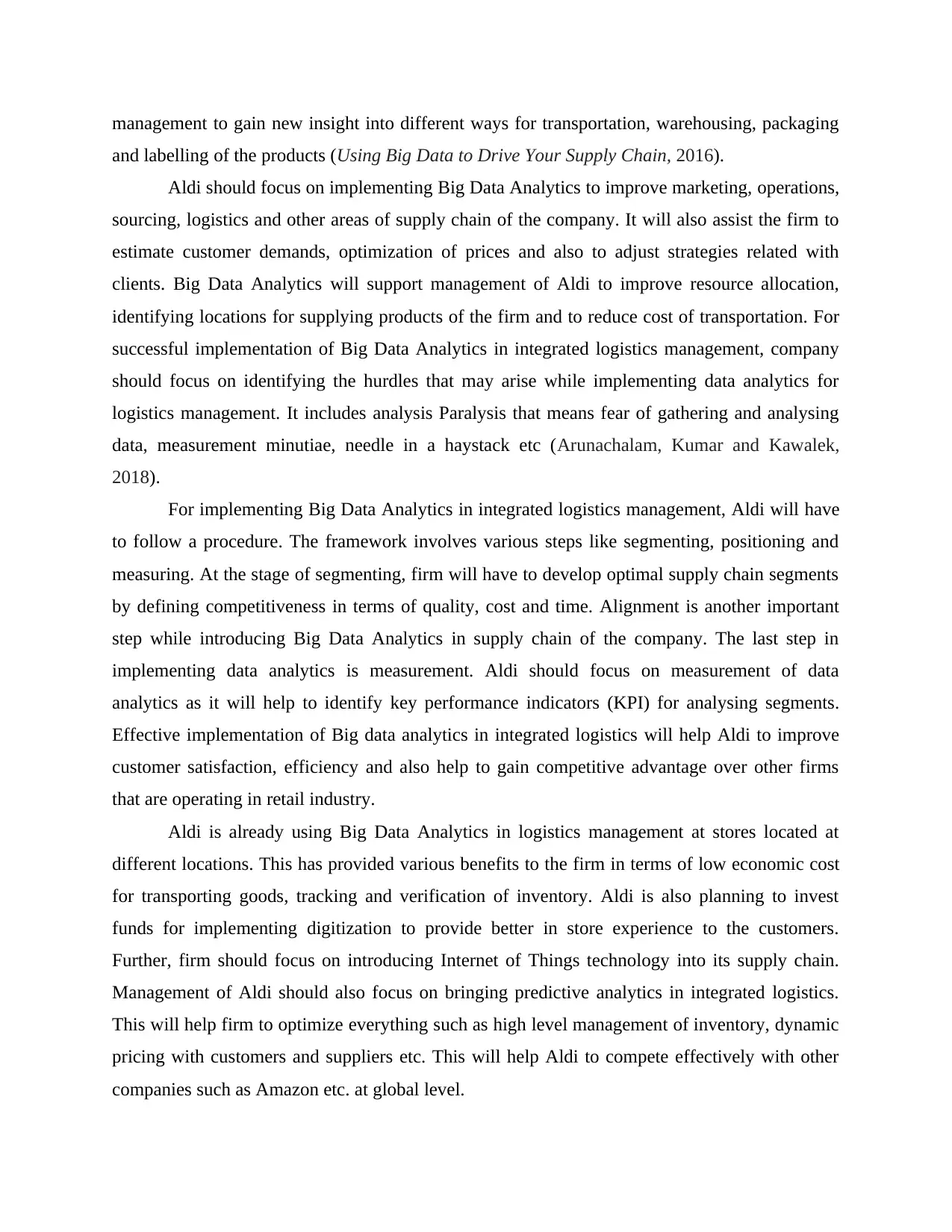
management to gain new insight into different ways for transportation, warehousing, packaging
and labelling of the products (Using Big Data to Drive Your Supply Chain, 2016).
Aldi should focus on implementing Big Data Analytics to improve marketing, operations,
sourcing, logistics and other areas of supply chain of the company. It will also assist the firm to
estimate customer demands, optimization of prices and also to adjust strategies related with
clients. Big Data Analytics will support management of Aldi to improve resource allocation,
identifying locations for supplying products of the firm and to reduce cost of transportation. For
successful implementation of Big Data Analytics in integrated logistics management, company
should focus on identifying the hurdles that may arise while implementing data analytics for
logistics management. It includes analysis Paralysis that means fear of gathering and analysing
data, measurement minutiae, needle in a haystack etc (Arunachalam, Kumar and Kawalek,
2018).
For implementing Big Data Analytics in integrated logistics management, Aldi will have
to follow a procedure. The framework involves various steps like segmenting, positioning and
measuring. At the stage of segmenting, firm will have to develop optimal supply chain segments
by defining competitiveness in terms of quality, cost and time. Alignment is another important
step while introducing Big Data Analytics in supply chain of the company. The last step in
implementing data analytics is measurement. Aldi should focus on measurement of data
analytics as it will help to identify key performance indicators (KPI) for analysing segments.
Effective implementation of Big data analytics in integrated logistics will help Aldi to improve
customer satisfaction, efficiency and also help to gain competitive advantage over other firms
that are operating in retail industry.
Aldi is already using Big Data Analytics in logistics management at stores located at
different locations. This has provided various benefits to the firm in terms of low economic cost
for transporting goods, tracking and verification of inventory. Aldi is also planning to invest
funds for implementing digitization to provide better in store experience to the customers.
Further, firm should focus on introducing Internet of Things technology into its supply chain.
Management of Aldi should also focus on bringing predictive analytics in integrated logistics.
This will help firm to optimize everything such as high level management of inventory, dynamic
pricing with customers and suppliers etc. This will help Aldi to compete effectively with other
companies such as Amazon etc. at global level.
and labelling of the products (Using Big Data to Drive Your Supply Chain, 2016).
Aldi should focus on implementing Big Data Analytics to improve marketing, operations,
sourcing, logistics and other areas of supply chain of the company. It will also assist the firm to
estimate customer demands, optimization of prices and also to adjust strategies related with
clients. Big Data Analytics will support management of Aldi to improve resource allocation,
identifying locations for supplying products of the firm and to reduce cost of transportation. For
successful implementation of Big Data Analytics in integrated logistics management, company
should focus on identifying the hurdles that may arise while implementing data analytics for
logistics management. It includes analysis Paralysis that means fear of gathering and analysing
data, measurement minutiae, needle in a haystack etc (Arunachalam, Kumar and Kawalek,
2018).
For implementing Big Data Analytics in integrated logistics management, Aldi will have
to follow a procedure. The framework involves various steps like segmenting, positioning and
measuring. At the stage of segmenting, firm will have to develop optimal supply chain segments
by defining competitiveness in terms of quality, cost and time. Alignment is another important
step while introducing Big Data Analytics in supply chain of the company. The last step in
implementing data analytics is measurement. Aldi should focus on measurement of data
analytics as it will help to identify key performance indicators (KPI) for analysing segments.
Effective implementation of Big data analytics in integrated logistics will help Aldi to improve
customer satisfaction, efficiency and also help to gain competitive advantage over other firms
that are operating in retail industry.
Aldi is already using Big Data Analytics in logistics management at stores located at
different locations. This has provided various benefits to the firm in terms of low economic cost
for transporting goods, tracking and verification of inventory. Aldi is also planning to invest
funds for implementing digitization to provide better in store experience to the customers.
Further, firm should focus on introducing Internet of Things technology into its supply chain.
Management of Aldi should also focus on bringing predictive analytics in integrated logistics.
This will help firm to optimize everything such as high level management of inventory, dynamic
pricing with customers and suppliers etc. This will help Aldi to compete effectively with other
companies such as Amazon etc. at global level.
⊘ This is a preview!⊘
Do you want full access?
Subscribe today to unlock all pages.

Trusted by 1+ million students worldwide
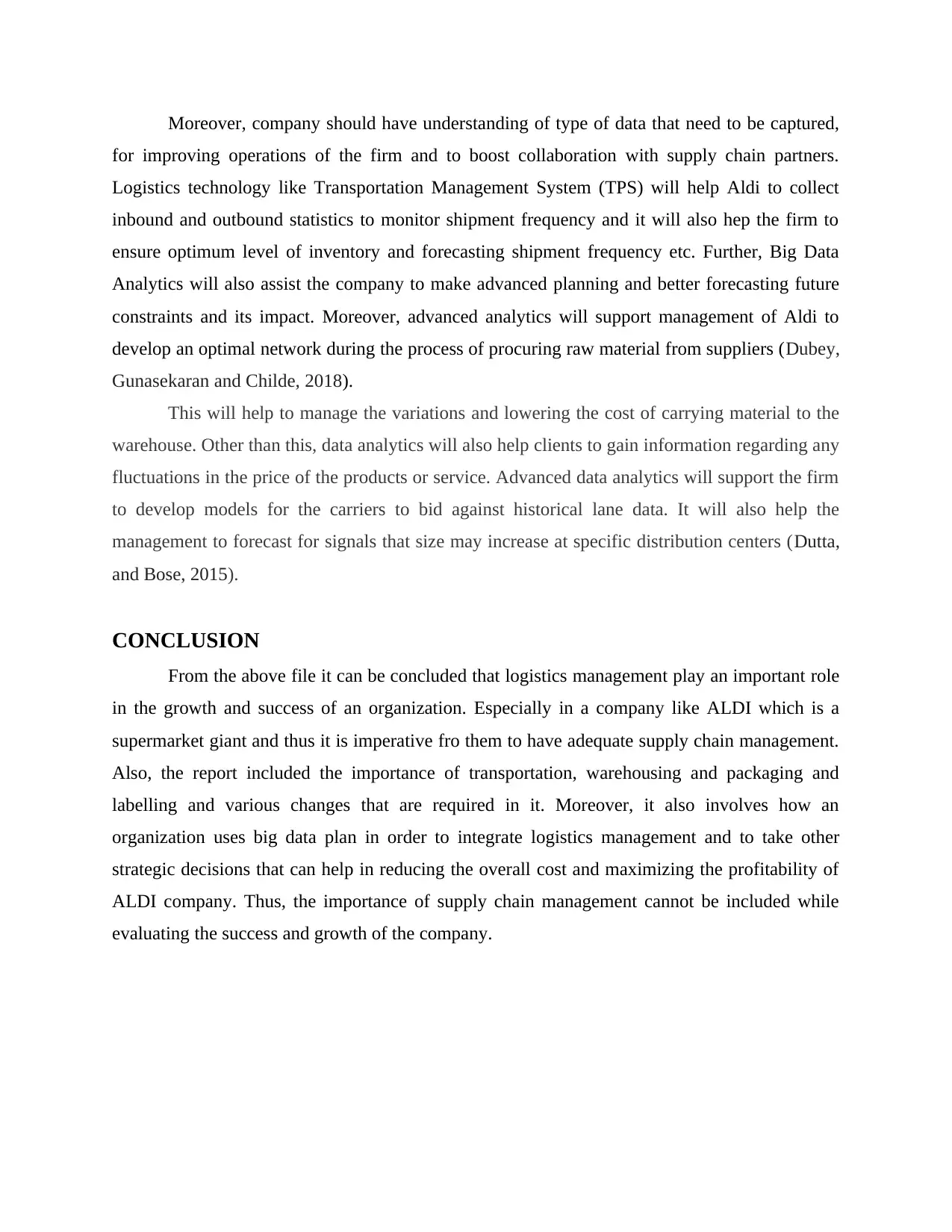
Moreover, company should have understanding of type of data that need to be captured,
for improving operations of the firm and to boost collaboration with supply chain partners.
Logistics technology like Transportation Management System (TPS) will help Aldi to collect
inbound and outbound statistics to monitor shipment frequency and it will also hep the firm to
ensure optimum level of inventory and forecasting shipment frequency etc. Further, Big Data
Analytics will also assist the company to make advanced planning and better forecasting future
constraints and its impact. Moreover, advanced analytics will support management of Aldi to
develop an optimal network during the process of procuring raw material from suppliers (Dubey,
Gunasekaran and Childe, 2018).
This will help to manage the variations and lowering the cost of carrying material to the
warehouse. Other than this, data analytics will also help clients to gain information regarding any
fluctuations in the price of the products or service. Advanced data analytics will support the firm
to develop models for the carriers to bid against historical lane data. It will also help the
management to forecast for signals that size may increase at specific distribution centers (Dutta,
and Bose, 2015).
CONCLUSION
From the above file it can be concluded that logistics management play an important role
in the growth and success of an organization. Especially in a company like ALDI which is a
supermarket giant and thus it is imperative fro them to have adequate supply chain management.
Also, the report included the importance of transportation, warehousing and packaging and
labelling and various changes that are required in it. Moreover, it also involves how an
organization uses big data plan in order to integrate logistics management and to take other
strategic decisions that can help in reducing the overall cost and maximizing the profitability of
ALDI company. Thus, the importance of supply chain management cannot be included while
evaluating the success and growth of the company.
for improving operations of the firm and to boost collaboration with supply chain partners.
Logistics technology like Transportation Management System (TPS) will help Aldi to collect
inbound and outbound statistics to monitor shipment frequency and it will also hep the firm to
ensure optimum level of inventory and forecasting shipment frequency etc. Further, Big Data
Analytics will also assist the company to make advanced planning and better forecasting future
constraints and its impact. Moreover, advanced analytics will support management of Aldi to
develop an optimal network during the process of procuring raw material from suppliers (Dubey,
Gunasekaran and Childe, 2018).
This will help to manage the variations and lowering the cost of carrying material to the
warehouse. Other than this, data analytics will also help clients to gain information regarding any
fluctuations in the price of the products or service. Advanced data analytics will support the firm
to develop models for the carriers to bid against historical lane data. It will also help the
management to forecast for signals that size may increase at specific distribution centers (Dutta,
and Bose, 2015).
CONCLUSION
From the above file it can be concluded that logistics management play an important role
in the growth and success of an organization. Especially in a company like ALDI which is a
supermarket giant and thus it is imperative fro them to have adequate supply chain management.
Also, the report included the importance of transportation, warehousing and packaging and
labelling and various changes that are required in it. Moreover, it also involves how an
organization uses big data plan in order to integrate logistics management and to take other
strategic decisions that can help in reducing the overall cost and maximizing the profitability of
ALDI company. Thus, the importance of supply chain management cannot be included while
evaluating the success and growth of the company.
Paraphrase This Document
Need a fresh take? Get an instant paraphrase of this document with our AI Paraphraser
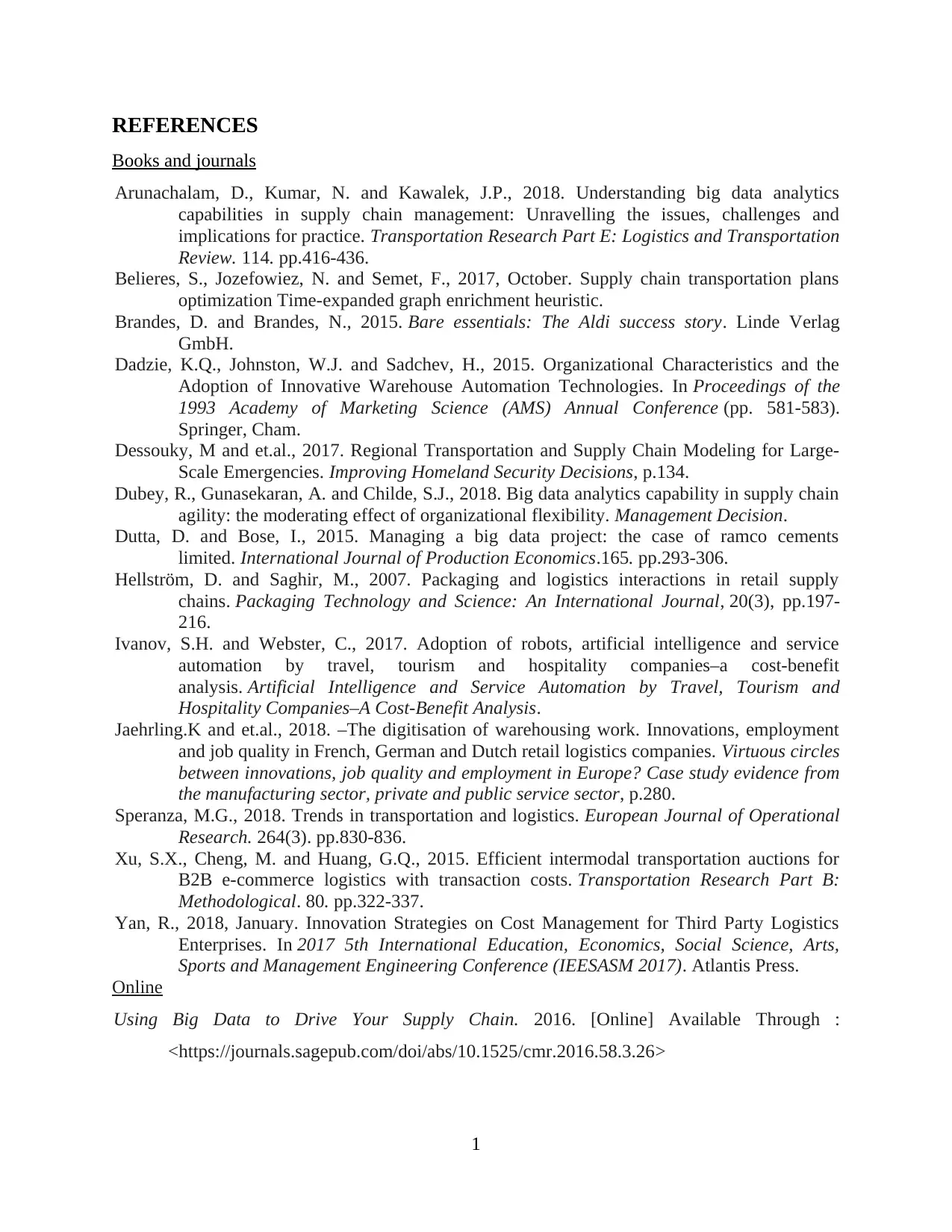
REFERENCES
Books and journals
Arunachalam, D., Kumar, N. and Kawalek, J.P., 2018. Understanding big data analytics
capabilities in supply chain management: Unravelling the issues, challenges and
implications for practice. Transportation Research Part E: Logistics and Transportation
Review. 114. pp.416-436.
Belieres, S., Jozefowiez, N. and Semet, F., 2017, October. Supply chain transportation plans
optimization Time-expanded graph enrichment heuristic.
Brandes, D. and Brandes, N., 2015. Bare essentials: The Aldi success story. Linde Verlag
GmbH.
Dadzie, K.Q., Johnston, W.J. and Sadchev, H., 2015. Organizational Characteristics and the
Adoption of Innovative Warehouse Automation Technologies. In Proceedings of the
1993 Academy of Marketing Science (AMS) Annual Conference (pp. 581-583).
Springer, Cham.
Dessouky, M and et.al., 2017. Regional Transportation and Supply Chain Modeling for Large-
Scale Emergencies. Improving Homeland Security Decisions, p.134.
Dubey, R., Gunasekaran, A. and Childe, S.J., 2018. Big data analytics capability in supply chain
agility: the moderating effect of organizational flexibility. Management Decision.
Dutta, D. and Bose, I., 2015. Managing a big data project: the case of ramco cements
limited. International Journal of Production Economics.165. pp.293-306.
Hellström, D. and Saghir, M., 2007. Packaging and logistics interactions in retail supply
chains. Packaging Technology and Science: An International Journal, 20(3), pp.197-
216.
Ivanov, S.H. and Webster, C., 2017. Adoption of robots, artificial intelligence and service
automation by travel, tourism and hospitality companies–a cost-benefit
analysis. Artificial Intelligence and Service Automation by Travel, Tourism and
Hospitality Companies–A Cost-Benefit Analysis.
Jaehrling.K and et.al., 2018. –The digitisation of warehousing work. Innovations, employment
and job quality in French, German and Dutch retail logistics companies. Virtuous circles
between innovations, job quality and employment in Europe? Case study evidence from
the manufacturing sector, private and public service sector, p.280.
Speranza, M.G., 2018. Trends in transportation and logistics. European Journal of Operational
Research. 264(3). pp.830-836.
Xu, S.X., Cheng, M. and Huang, G.Q., 2015. Efficient intermodal transportation auctions for
B2B e-commerce logistics with transaction costs. Transportation Research Part B:
Methodological. 80. pp.322-337.
Yan, R., 2018, January. Innovation Strategies on Cost Management for Third Party Logistics
Enterprises. In 2017 5th International Education, Economics, Social Science, Arts,
Sports and Management Engineering Conference (IEESASM 2017). Atlantis Press.
Online
Using Big Data to Drive Your Supply Chain. 2016. [Online] Available Through :
<https://journals.sagepub.com/doi/abs/10.1525/cmr.2016.58.3.26>
1
Books and journals
Arunachalam, D., Kumar, N. and Kawalek, J.P., 2018. Understanding big data analytics
capabilities in supply chain management: Unravelling the issues, challenges and
implications for practice. Transportation Research Part E: Logistics and Transportation
Review. 114. pp.416-436.
Belieres, S., Jozefowiez, N. and Semet, F., 2017, October. Supply chain transportation plans
optimization Time-expanded graph enrichment heuristic.
Brandes, D. and Brandes, N., 2015. Bare essentials: The Aldi success story. Linde Verlag
GmbH.
Dadzie, K.Q., Johnston, W.J. and Sadchev, H., 2015. Organizational Characteristics and the
Adoption of Innovative Warehouse Automation Technologies. In Proceedings of the
1993 Academy of Marketing Science (AMS) Annual Conference (pp. 581-583).
Springer, Cham.
Dessouky, M and et.al., 2017. Regional Transportation and Supply Chain Modeling for Large-
Scale Emergencies. Improving Homeland Security Decisions, p.134.
Dubey, R., Gunasekaran, A. and Childe, S.J., 2018. Big data analytics capability in supply chain
agility: the moderating effect of organizational flexibility. Management Decision.
Dutta, D. and Bose, I., 2015. Managing a big data project: the case of ramco cements
limited. International Journal of Production Economics.165. pp.293-306.
Hellström, D. and Saghir, M., 2007. Packaging and logistics interactions in retail supply
chains. Packaging Technology and Science: An International Journal, 20(3), pp.197-
216.
Ivanov, S.H. and Webster, C., 2017. Adoption of robots, artificial intelligence and service
automation by travel, tourism and hospitality companies–a cost-benefit
analysis. Artificial Intelligence and Service Automation by Travel, Tourism and
Hospitality Companies–A Cost-Benefit Analysis.
Jaehrling.K and et.al., 2018. –The digitisation of warehousing work. Innovations, employment
and job quality in French, German and Dutch retail logistics companies. Virtuous circles
between innovations, job quality and employment in Europe? Case study evidence from
the manufacturing sector, private and public service sector, p.280.
Speranza, M.G., 2018. Trends in transportation and logistics. European Journal of Operational
Research. 264(3). pp.830-836.
Xu, S.X., Cheng, M. and Huang, G.Q., 2015. Efficient intermodal transportation auctions for
B2B e-commerce logistics with transaction costs. Transportation Research Part B:
Methodological. 80. pp.322-337.
Yan, R., 2018, January. Innovation Strategies on Cost Management for Third Party Logistics
Enterprises. In 2017 5th International Education, Economics, Social Science, Arts,
Sports and Management Engineering Conference (IEESASM 2017). Atlantis Press.
Online
Using Big Data to Drive Your Supply Chain. 2016. [Online] Available Through :
<https://journals.sagepub.com/doi/abs/10.1525/cmr.2016.58.3.26>
1

2
⊘ This is a preview!⊘
Do you want full access?
Subscribe today to unlock all pages.

Trusted by 1+ million students worldwide
1 out of 12
Related Documents
Your All-in-One AI-Powered Toolkit for Academic Success.
+13062052269
info@desklib.com
Available 24*7 on WhatsApp / Email
![[object Object]](/_next/static/media/star-bottom.7253800d.svg)
Unlock your academic potential
Copyright © 2020–2026 A2Z Services. All Rights Reserved. Developed and managed by ZUCOL.





